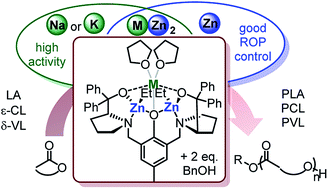Combining alkali metals and zinc to harness heterometallic cooperativity in cyclic ester ring-opening polymerisation†
Abstract
Heterometallic cooperativity is an emerging strategy to elevate polymerisation catalyst performance. Here, we report the first heterotrimetallic Na/Zn2 and K/Zn2 complexes supported by a ProPhenol ligand, which deliver “best of both” in cyclic ester ring-opening polymerisation, combining the outstanding activity (Na/K) and good control (Zn2) of homometallic analogues. Detailed NMR studies and density-functional theory calculations suggest that the Na/Zn2 and K/Zn2 complexes retain their heterometallic structures in the solution-state. To the best of our knowledge, the K/Zn2 analogue is the most active heterometallic catalyst reported for rac-lactide polymerisation (kobs = 1.7 × 10−2 s−1), giving activities five times faster than the Na/Zn2 complex. These versatile catalysts also display outstanding performance in ε-caprolatone and δ-valerolactone ring-opening polymerisation. These studies provide underpinning methodologies for future heterometallic polymerisation catalyst design, both in cyclic ester polymerisation and other ring-opening (co)polymerisation reactions.



 Please wait while we load your content...
Please wait while we load your content...